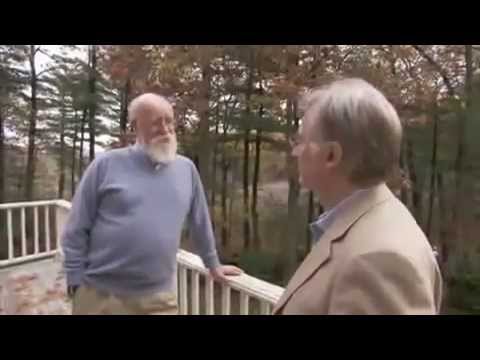Richard Dawkins Foundation for Reason & Science
This conversation between Richard Dawkins and Dan Dennett is raw, unedited footage from “Sex, Death and the Meaning of Life”, a 3-part Channel Four TV documentary presented by Richard.
At the end, at the request of the Director, Russell Barnes, I read the last lines of Unweaving the Rainbow.
Source




I'm a bit more pessimistic about this whole existence thing. I don't think life is that great or a "privilege" for many people (let alone non-human animals) in this world, and none of us give consent to be born into our circumstances. Essentially, life is a gamble imposed upon us, whether we're fortunate to live a good life, or born into wretched conditions and poverty. There is a degree of optimism bias that helps us to put our suffering into a more palatable context. But there are people suffering the worst there is to suffer – the gamble made by their parents made all the more reckless. So although it's easy for people living the good life to feel privileged, this is not the complete picture of life or the brutal indifference of nature.
The usual response to this is "why don't you kill yourself if life is so bad?". Because killing yourself causes MORE not less suffering, specifically among your loved ones who must live with the grief. Anyone who was close to someone who committed suicide will know how life shattering it is. So let's be honest about the gamble involved in the creation of sentient life (before we reproduce), but not lose sight of why we, who do exist must, in most cases, continue to exist and try to reduce net suffering as much as we can.
Two intelligent beings, smarter than all of the religious worshippers in the whole wide world. Dawkins accent is definitely comforting and as fluent as the river in Egypt.
Well, I am very glad that even atheist say "Hallelujah!". Daniel Dennett says: "I think… 'Hallelujah!' It's just spectacular! It's so wonderful… It's fantastic!" And Halleljah means: "Praise ye YHWH!" (Yahweh) So, yes "Hallelujah! for the great things God has done!"
And a second remark: You seem to forget that "Einstein's nobel space curve" is an attempt to describe something that already exist and does not create anything in the Universe. So it can not "upstage" anything God has said or done.
The universe is wonder, our life is wonder and one day all will bow before God and worship Our Creator! Hallelujah!
It's evident Richard knows few animals. Indeed many will tell you that many animals other than homo sapiens often know their imminent death. The house cat is an example.
Hardly looking fit. Moobs and visceral fat.
Also this is bollox
The truly scientific statement to make about the after life and whether life continues beyond death is this: We don't know what happens when we die! It is a mystery that may never be solved.
To assume consciousness is a by-product of brain activity is just that; an assumption. The belief that the brain is responsible for consciousness has no conclusive evidence to back it up. Therefore to say definitively that when the brain dies consciousness dies is deeply unscientific and I would expect more objectivity from someone of Professor Dawkins' caliber.
In fact there are many arguments that consciousness is not actually created in the brain, but the brain is a receiver of consciousness. Similar to when you watch television, the T.V is not creating the video but merely receiving the signal and translating the coded information into the film you are seeing. But the T.V is not responsible for the film. In a similar way, no neurologist has ever found a center of consciousness in the brain. There doesn't appear to be a physical basis for consciousness.
The mystics who have studied the nature of consciousness through the inner science of meditation have all observed the non local, absolute nature of consciousness. From a scientific perspective, consciousness is actually the basis of all matter. There are many reputable scientists who share this view. Namely Roger Penrose (professor at oxford university), John Haggelin Phd, Neils bohr, Fritjof Capra, Werner Heisenberg etc.
what book is richard dawkins reading from?
DEATH IS A HUMAN CONSTRUCT, YOU DON'T DIE YOU LIVE FOREVER …………. (FAMILY)
I mean I agree with Dawkins on a lot of things but seriously he often just seems desperate to show his perceived superiority over believers. What the fuck is that babbling about 'being privileged to even be born in the first place'. He is a biologist? Life is not so rare. There are 7 billion people.
There seems to be a bit of a misconception about why atheists fear death at least from my point of view. I don't fear death because I am worried about it being painful or that I will suffer but because I like living and I want to do it for as long as possible and I fear it ending.
The astounding improbability huh…?
What sources of information did Richard Dawkins and his assistants use when studying Leo Tolstoy’s views regarding religion? The fact is that the content and results of the intellectual, philosophical, and spiritual search of Leo Tolstoy are completely misrepresented in the film "Sex, Death and Meaning of Life". I believe that in this particular case the scientist could not correctly approach a subject of study because he restricted himself by using secondary sources of information.
In brief, Tolstoy, as well as R.Dawkins, proposed to abolish the God of Abraham. L.Tolstoy entirely denied religious mysticism (this led to his excommunication in 1901). L.Tolstoy arrived to the idea of a god as a humanistic concept of the unity of all people: "Christianity not as mystical teaching, but rather as new life-understanding".
Taking into account the cross-cultural studies of sociopathy, each society needs the teaching of life-understanding in some form.
Someone should tell this clown that 'Allelujah' means 'praise the Lord'.
I find it a bit funny/odd that at 3:50 DD says, "Hallelujah" ("praise God") & Dawkins repeats it. LOL. Don't get me wrong, I am a fan of DD.
are we really alone among animals in seeing our end 7:20 (barring human-decisions of euthanasia, etc)…
Very, very, very touching, yes, to think that you’ll reunite with your loved ones, friends, professors, etc would be comforting, but it’s not going to happen, when we die—we die, that’s why life, past, present, and future if any is so important…
Which pixel is Richard Dawkins?
I met Richard in the Peter Singer's video with him. Thank you for reminding us how marvelous life can be.
Wow, I never thought that Atheism is so close to Hinduism and Buddhism, and also Kabbalist Judaism. And like what Osho teaches. Incredible.
Richard is strangely "religious" in his outlook, considering he's a skeptic.
When an atheist dies:
They become a myth,
and their teachings become false.
This was a MOST UNSATISFACTORY discussion. Both Richard and Daniel have had brushes with death now, [and Dennet is 76, Dawkins is 77], but neither confronted the actual question – which is how does an atheist feel about being snuffed out like a candle?
And they will be snuffed out, because if you believe nothing is there, nothing you will receive. And if you do not believe in reincarnation, you will not be reincarnated.
So both these two face eternity in – nothingness – the black ink of absolutely nothing at all, no sounds, no images, no tastes, no sensations. Conscious but entirely devoid of any stimulus whatsoever. Hell might be better.
From Thank Goodness by Daniel Dennett
“…………Two weeks ago, I was rushed by ambulance to a hospital where it was determined by c-t scan that I had a "dissection of the aorta"—the lining of the main output vessel carrying blood from my heart had been torn up, creating a two—channel pipe where there should only be one. Fortunately for me, the fact that I'd had a coronary artery bypass graft seven years ago probably saved my life, since the tangle of scar tissue that had grown like ivy around my heart in the intervening years reinforced the aorta, preventing catastrophic leakage from the tear in the aorta itself. After a nine-hour surgery, in which my heart was stopped entirely and my body and brain were chilled down to about 45 degrees to prevent brain damage from lack of oxygen until they could get the heart-lung machine pumping, I am now the proud possessor of a new aorta and aortic arch, made of strong Dacron fabric tubing sewn into shape on the spot by the surgeon, attached to my heart by a carbon-fiber valve that makes a reassuring little click every time my heart beats.
As I now enter a gentle period of recuperation, I have much to reflect on …… Friends were anxious to learn if I had had a near-death experience, and if so, what effect it had had on my longstanding public atheism. Had I had an epiphany? “
And the simple answer here is no he didn’t. A foretaste of things to come.
This gives me hope!
I'm not afraid to die anymore. It sounds like peace for a while from this crazy first heaven
Thanks so much professor Dawkins :). You’re right, we didn’t exist for billion of years and that’s just fine. We exist now. and we will leave eventually just as nature is intended. maybe one day we will be able to extend life indefinitely but it’s okay if that’s not today
Something can't come from nothing because there would then need to be a change from there being nothing to there being something, but there can be no change without anything. And if something from nothing were possible then so many different types of things would have always been spontaneously existing, some of them doing or causing the same things possibly. Likewise with things that are the same and any amount of them potentially doing and causing different things, since if a cause is unnecessary, there is nothing to prevent this being possible. The requirements for science, then, would not exist, since nothing would have to be a certain way to cause a specific result from it.
Particles coming in and out of empty space can't be evidence for something from nothing, because empty space is still space which is still something, or else there would be nothing for those particles to exist in. Empty space and vacuums have a minimal amount of energy in them to produce these particles, have dimensions that can bend and be measured, and the amount of energy, that obviously can also be measured, can change. This is all only possible because of how already existing physics make it so, so not only can nothing not be seen or tested to verify the possibility of it, but nothing is by definition what does not exist, so there being nothing is as self contradictory as there being no such thing as truth.
Nothing can have a beginningless infinite past because it would take an infinite amount of time for anything to happen then, so nothing ever would because there never would be that much time. So for anything to exist there has to be something or someone to cause them. The only type of entity that could cause the first beginning would have to be independent of time and space.
There's plenty of well known ancient historians who wrote about Jesus, one of which being Luke who also wrote a gospel. There's about 42 documents saying something about Jesus, a lot of which are not positive of Christianity. Some historians also account for Jesus miracles recorded in the gospels or just that Jesus was famous for miracles that they dismiss as illusionist tricks, or otherwise sorcery. An example is a record from Thallus in the 50's A.D. mentioning the darkness that occurred during Jesus crucifixion and attempting to explain it as a solar eclipse. Africanus, who quoted this record about 2 centuries later, mentioned that an eclipse wouldn't be possible because it happened during the Jewish Passover, when the moon is full and diametrically opposite from the sun. Both of these historians records only survive as quotes in other historical writings, like in the records of Eusebius, from what was still left of their respective work during the time. Tacitus, born 56 A.D., references in 116 A.D. in his Annals that Christians were killed for saying Jesus was resurrected. He recorded "Christus, from whom the name had its origin, suffered the extreme penalty during the reign of Tiberius at the hands of one of our procurators, Pontius Pilatus, and a most mischievous superstition, thus checked for the moment, again broke out not only in Judaea, the first source of the evil, but even in Rome, where all things hideous and shameful from every part of the world find their centre and become popular". Suetonius, born 69 A.D., recorded in 122 A.D., "After the great fire at Rome . . . . Punishments were also inflicted on the Christians, a sect professing a new and mischievous religious belief". The only way that many people would believe that Jesus was resurrected was if they actually saw him. Even his most devoted listeners doubted his resurrection until they saw him and some even after, or didn't immediately recognize him. The same culture that presented Jesus to be executed with the accusation of apostasy and sorcery is not going to suddenly change their minds about him and invent stories in agreement with his claims that they originally hated him for.
And none of them could have hallucinated him because neurological research has shown that shared hallucinations don’t happen and in general can't happen anyway when you aren’t expecting to see the person or have no care to. Paul on his way to Damascus saw and heard Jesus, and Paul was with other people who too saw him and turned away because the light of Jesus was so bright that it blinded Paul. Again multiple people seeing the same thing that they didn't expect. The talmud records that Jesus was arrested for accusation of apostasy and sorcery and that no one defended him in his trials. Simply knowing the culture of his time is enough to deduce that the converts were reporting a real encounter. It's recorded that one of the disciples touched Jesus after he appeared to them and that he ate. Paul records having met about 500 witnesses. These new testament accounts are consistent with Josephus and the Roman historical records talking about the teaching of Jesus resurrection.
The only known forgery recording Jesus is of an account by Josephus, born 37 A.D., but that record is in every copy of his original compilation containing it, so historians know that Josephus wrote an original that Christians later altered. There is a copy of it in another language, older than most other copies, that has none of the Christian praise in the interpolation. That also doesn't take into account his other record referring to James the brother of Jesus, the so called Christ. There is no alteration of that one. We have earlier evidence for Jesus than most other ancient people, recorded by historians who were alive when most of the witnesses of the events still were. Records of Augustus, Tiberius, Hannibal and Nero weren't made until much later after their lives. A few other such historians were Emperor Trajan, born 53 A.D.; Pliny the Younger, born 61 A.D.; and Phlegon, born 80 A.D.. Most other ancient people weren't recorded until a century or more after the events, including kings and emperors, and they aren't disputed either. Its not just apologetic's who use these accounts, most historians, regardless of belief, don't deny Jesus was real. it's mostly the miracles that are controversial, but with no evidence inconsistent with them, just skepticism that miracles can even happen. The reason Roman emperors had miracles attributed to them was because of threats to anyone who did not record those stories, such as the scenario with Alexander, because they wanted to be glorified to bolster their reputation. Most of those records of the Emperors weren’t written until centuries later anyway. http://www.garyhabermas.com/…/historicaljesus.htm... http://reasonsforjesus.com/26-powerful-reasons-why…/
No one who ever wrote about Jesus was ever questioned by anyone about if he actually existed. People who knew anything about Jesus would be around to say how accurate these claims were that were being recorded. There were plenty of people who hated his teachings who would have loved to refute that he was real, if he was made up. The problem is he was seen by many people in person. There are over 5000 copies of the new testament in its original language and over 24,000 total, all of which are mostly consistent with each other and modern translations. The earliest copy still around is dated to before the third century. The only differences are the story of Jesus and the prostitute not being in the oldest copies and textual variants. The second best preserved document is Homers Iliad, with only over 600 total copies, and the earliest being 300 years after the original. We know the new testament was completed before the second century because Clement of Rome and Ignatius of Antioch quote it in the late first century. The gospels would be some of the earliest of the new testament compilation. https://historyforatheists.com/…/did-jesus-exist-the…/ https://historyforatheists.com/…/easter-the-existence…/
Beautiful
So intense.
This video is kinda dorky….
Daniel looks like Santa more than Darwin?????